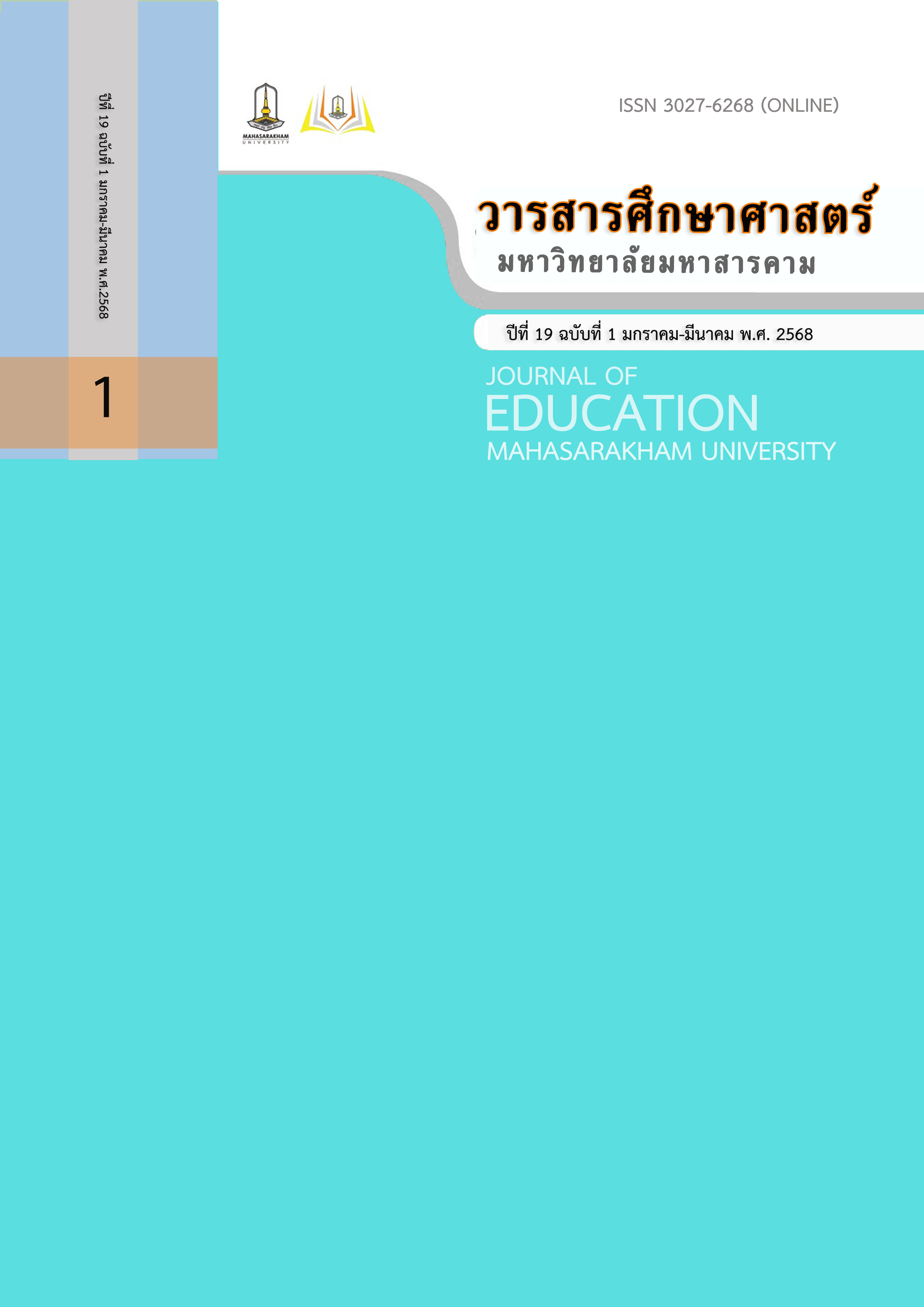The Effect of Reflective Teaching on Metacognitive Awareness of Preservice Teacher in the Social Study Teaching Course
Main Article Content
Abstract
This research aimed to: 1) develop the reflective thinking activities to enhance metacognitive awareness among pre-service teachers in the course on the methods of teaching social studies, 2) compare the metacognitive awareness of pre-service teachers before and after participating in the course, and 3) examine the learning achievement after implementing the learning activities. The target study consisted of 54 Social Studies major students from the Faculty of Humanities and Social Sciences, Thepsatri Rajabhat University, enrolled in the course of Social Studies Teaching Methodology during the second semester of the 2023 academic year. The tools used in the study included 15 learning management plans, a 40-item learning achievement test, a 52-item metacognitive awareness. The statistical methods used were mean and standard deviation.
Research Findings:
- The development of the learning management plans resulted in 15 plans, each 4 hours long, totaling 60 hours. The appropriateness of these plans was evaluated with scores ranging from 0.80 to 1.00.
- Comparing levels of metacognitive awareness, it was found that the post-learning average in the knowledge component of metacognition was higher than the pre-learning average, with a difference of +1.10. In the control component of metacognition, the post-learning average was also higher than the pre-learning average, with a difference of +0.62.
- Comparing learning achievement before and after the learning activities, the post-learning achievement of students (
=32.55,
= 2.22) was higher than the pre-learning achievement (
=21.50,
= 2.44), with a difference of +11.05.
Downloads
Article Details

This work is licensed under a Creative Commons Attribution-NonCommercial-NoDerivatives 4.0 International License.
References
กมลวรรณ บัณฑิตสาธิสรรค์. (2561). การสะท้อนคิดของนักศึกษาสหกิจศึกษา มหาวิทยาลัยเทคโนโลยีสุรนารี. วิทยานิพนธ์ปริญญาการจัดการมหาบัณฑิต, สาขาวิชาสหกิจศึกษา สำนักวิชาเทคโนโลยีสังคม, มหาวิทยาลัยเทคโนโลยีสุรนารี.
กัตตกมล พิศแลงาม. (2562). ผลการจัดการเรียนรู้ด้วยวิธีการสะท้อนคิดโดยใช้รูปแบบวงจรของกิ๊บส์ที่ส่งผลต่อผลสัมฤทธิ์ทางการเรียนในรายวิชาภาษา การสื่อสาร และเทคโนโลยีสารสนเทศ หมวดวิชาศึกษาทั่วไป. วารสารบัณฑิตศึกษา มหาวิทยาลัยราชภัฏวไลยอลงกรณ์ ในพระบรมราชูปถัมภ์, 13(2), 1-13.
กัลยา ศรีมหันต์, และจิริยา อินทนา. (2559). รายงานการวิจัยเรื่อง การศึกษาผลการจัดการเรียน การ สอนแบบบูรณาการตามสภาพจริงร่วมกับการสะท้อนคิดเพื่อให้ผู้เรียนให้การดูแล ด้วยหัวใจ ความเป็นมนุษย์. ราชบุรี: วิทยาลัยพยาบาลบรมราชชนนี ราชบุรี สถาบันพระบรมราชชนก.
คณะมนุษยศาสตร์และสังคมศาสตร์ มหาวิทยาลัยราชภัฏเทพสตรี. (2562). หลักสูตรครุศาสตรบัณฑิต สาขาวิชาสังคมศึกษา (4 ปี) (หลักสูตรปรับปรุง พ.ศ. 2562). ลพบุรี: คณะมนุษยศาสตร์และสังคมศาสตร์ มหาวิทยาลัยราชภัฏเทพสตรี.
ปิยานี ณ นคร, และคณะ. (2559). การศึกษาแนวทางการจัดการเรียนรู้ผ่านการสะท้อนคิด เพื่อพัฒนากระบวนการคิดอย่างมีวิจารณญาณในนักศึกษาพยาบาล. รามาธิบดีพยาบาลสาร, 22(2), 206-221.
พิมพ์พิรัญ ปัญโญ, และชาตรี ฝ่ายคำตา. (2559). การพัฒนาความเข้าใจธรรมชาติของวิทยาศาสตร์ ของนักเรียนชั้นมัธยมศึกษาปีที่ 5 โดยการจัดการเรียนรู้แบบชัดแจ้งร่วมกับการอภิปราย สะท้อนความคิดเรื่อง ของแข็ง ของเหลว และแก๊ส. วารสารหน่วยวิจัยวิทยาศาสตร์ เทคโนโลยีและสิ่งแวดล้อมเพื่อการเรียนรู้, 7(2), 265-284.
ศิริพร สว่างจิตร, กุสุมา กังหลี, และนันทิกานต์ กลิ่นเชตุ. (2562). ผลของการใช้รูปแบบการเรียน การสอนแบบกระบวนการกลุ่มผ่านการสะท้อนคิดเพื่อเสริมสร้างผลสัมฤทธิ์ทางการเรียนและทักษะด้านการคิดอย่างมีวิจารณญาณและการแก้ปัญหา สำหรับนักเรียนพยาบาล วิทยาลัยพยาบาลกองทัพบก. วารสารพยาบาลทหารบก, 20(3), 333–342.
สังวรณ์ งัดกระโทก, นลินี ณ นคร, ศศิธร ชุตินันทกุล, ปรารถนา พลอภิชาติ, และปิยนาฏ สิทธิฤทธิ์. (2560). รายงานการวิจัย เรื่อง การพัฒนาเครื่องมือวัดและประเมินเมตาคอคนิชั่นของนักเรียนระดับประถมศึกษา และมัธยมศึกษา (รายงานผลการวิจัย). กรุงเทพฯ: สถาบันทดสอบทางการศึกษาแห่งชาติ (องค์การมหาชน).
สุพรรณิการ์ ชนะนิล. (2559). การพัฒนากิจกรรมการเรียนรู้ของนักศึกษาครูด้วยกิจกรรมสะท้อนคิด โดยใช้รูปแบบ 3-R ในรายวิชาการวัดผลและประเมินผลทางคณิตศาสตร์. วารสาร มหาวิทยาลัยราชภัฏร้อยเอ็ด, 11(2), 239-249.
ไหมไทย ไชยพันธุ์. (2562). การพัฒนาพฤติกรรมมนุษย์. กรุงเทพฯ: สำนักพิมพ์จุฬาลงกรณ์วิทยาลัย.
เอกชัย วิเศษศรี, และวรรณี แกมเกตุ. (2558). โมเดลเชิงสาเหตุของทักษะการสะท้อนคิดและผลสัมฤทธิ์ทางการเรียนวิชาวิทยาศาสตร์ของนักเรียนระดับชั้นประถมศึกษาปีที่ 6 ที่มีการสอนแบบสะท้อนคิดของครูเป็นตัวแปรปรับ: การวิจัยเชิงทดลอง. An Online Journal of Education, 10(4), 333–344.
Anderson, N. J. (2002). The Role of Metacognition in L2 Teaching and Learning. ERIC Digest. t. Retrieved April 15, 2024, from http://www/-ericdigests.org/.
Dewey. (1933). How We Think, In Mental Discipline in Modern Education. Madison:University of Wisconsin Press.
Flavell, J. H. (1976). Metacognition and cognitive monitoring: A new area of cognitive-developmental inquiry. American Psychologist, 34(10), 906-911.
Gibbs, G. (1988). Learning by Doing: A Guide to Teaching and Learning Methods. Oxford Further Education Unit.
Schraw, G., & Dennison, R. S. (1994). Assessing Metacognitive Awareness. Contemporary Educational Psychology, 19(4), 460-475.


